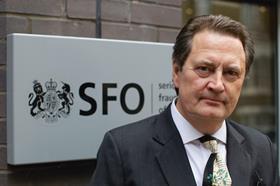The Serious Fraud Office (SFO) has said it is making changes to ensure that expert witnesses it instructs in future trials are sufficiently capable, including prioritising due dillegence checks, following a judgment in which the office was heavily criticised for its use of a witness.
In R v Alex Julian Pabon, last month the Court of Appeal dismissed ex Barclays trader Alex Pabon’s bid to overturn a conviction for rigging the Libor interest rate. But the court said the SFO’s decision to call ex-trader Saul Haydon Rowe as a witness in the intiail trial turned out to be an ‘embarrassing debacle’.

In a letter to the Justice Committee, which the committee published today, SFO chief David Green said the office had ‘reviewed its process’ since the judgment and is planning several modifications.
Green, who departs the SFO this week, said that although he remained of the view that ‘Rowe’s conduct reflected a lack of integrity on his part’ the SFO had taken the opportunity to review its processes as it told the court it would.
The planned modifications include:
- Frontloading due diligence checks prior to formal evaluation of expert witnesses;
- Requiring individuals to confirm understanding of their legal duties and disclosure obligations at an early stage, at the time of instruction and before giving evidence;
- Ensuring consistency of approach to formal evaluation by scoring perspective witnesses against standardised criteria to assess their suitability and expertise.
- Implementing enhanced conflict checks.
In 2016 Pabon was jailed alongside three other traders for conspiracy to defraud. He was released last year.
In his bid to overturn the conviction Pabon, represented by London firm IBB Solicitors, argued that the evidence Rowe gave during his initial trial was incomplete or inaccurate and could have damaged his credibility.
On appeal, Lord Justice Gross, Mr Justice Sweeney and Mr Justice Haddon-Cave said that although Rowe’s evidence had ‘significant failings’ it had ‘no impact on the outcome of the case’.
Rowe was paid by the SFO to give evidence in Libor prosecutions. His failings, according to the court, included obscuring the role of others during the prosecution and not informing the SFO or court of the limits of his expertise.



























2 Readers' comments